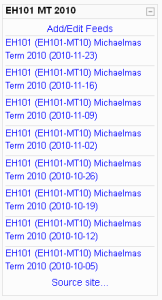Today I’m at the BbWorld Europe conference in Nice, discussing all things Blackboard. The weather’s lovely, thanks very much, but as we’re installed in a windowless concrete monolith, opportunities for working on my tan are limited.
Bruno Lanvin of the World Bank delivered an interesting keynote presentation this morning, discussing the impact of knowledge and technology transfer in driving globalization. I won’t paraphrase him too much, as his presentation will be posted to the Blackboard website later on, and his slides will work pretty well without the voice over, but I was struck by some of his statistics.
This year, humanity will generate some colossal number of exabytes of new “information”, equivalent to the sum total of information generated in the last 5000 years. He didn’t comment on how much of this stuff will be useful; I have a gloomy suspicion that 90% will be viagra spam, and much of the remainder will be pointless barking into cyberspace in the form of blogging.
But let’s assume that plenty of “applicable knowledge” is generated. Students now entering the third year of a degree programme will find the stuff they learned in their first year is out of date. As educators, therefore, we should be concentrating on developing learning skills rather than content, since we are preparing students for jobs that haven’t been created, to use technologies that haven’t been invented, and solve problems we don’t even know exist.
Next, I attended a panel session with early adopters of WebCT/Blackboard Vista. Only some of them had upgraded to Vista 4, some relatively painlessly, others… less so. One of the presenters made an interesting point about scalability: yes, you can add a few application nodes and extra database servers and run the whole shebang behind a load-balancer to serve hundreds of concurrent users, but some of the software tools themselves don’t scale particularly well. The assignments tool, for example, rapidly becomes unwieldy once you get past 50 students on a course. To be fair, I’m sure there are examples in all VLEs.
Each presenter made passing reference to “stability” being a source of complaints from the users. A fellow delegate saved me the job of pressing them on this point. Perhaps unsurprisingly, given they were invited to speak by the vendor, the presenters did a good job of blaming external factors, such as the unexpected consequences of operating system updates, pop-up blockers buried in some anti-spyware tool, Java version changes and so forth. I almost followed up by asking whether it’s such a good idea to impose strict preconditions on the user environment in the first place, but perhaps that’s a question for the developers themselves.
Chris







